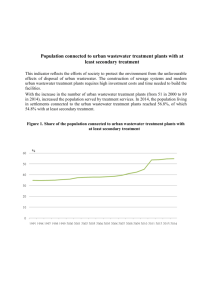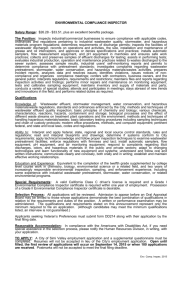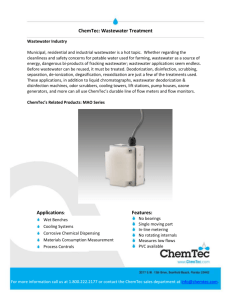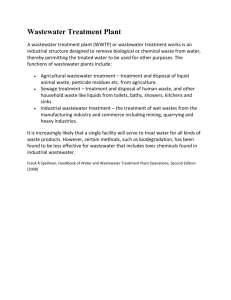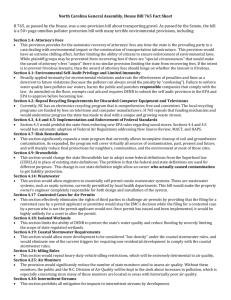HWY 64 sw-ww MSA executive summary 11-13-14
advertisement
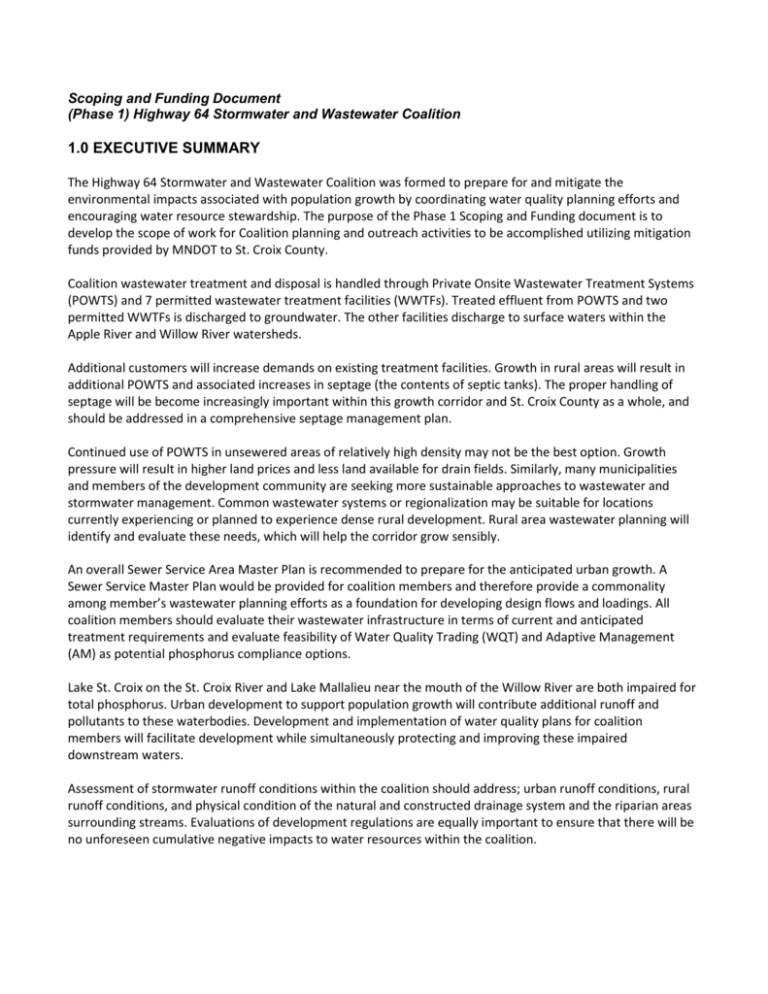
Scoping and Funding Document (Phase 1) Highway 64 Stormwater and Wastewater Coalition 1.0 EXECUTIVE SUMMARY The Highway 64 Stormwater and Wastewater Coalition was formed to prepare for and mitigate the environmental impacts associated with population growth by coordinating water quality planning efforts and encouraging water resource stewardship. The purpose of the Phase 1 Scoping and Funding document is to develop the scope of work for Coalition planning and outreach activities to be accomplished utilizing mitigation funds provided by MNDOT to St. Croix County. Coalition wastewater treatment and disposal is handled through Private Onsite Wastewater Treatment Systems (POWTS) and 7 permitted wastewater treatment facilities (WWTFs). Treated effluent from POWTS and two permitted WWTFs is discharged to groundwater. The other facilities discharge to surface waters within the Apple River and Willow River watersheds. Additional customers will increase demands on existing treatment facilities. Growth in rural areas will result in additional POWTS and associated increases in septage (the contents of septic tanks). The proper handling of septage will be become increasingly important within this growth corridor and St. Croix County as a whole, and should be addressed in a comprehensive septage management plan. Continued use of POWTS in unsewered areas of relatively high density may not be the best option. Growth pressure will result in higher land prices and less land available for drain fields. Similarly, many municipalities and members of the development community are seeking more sustainable approaches to wastewater and stormwater management. Common wastewater systems or regionalization may be suitable for locations currently experiencing or planned to experience dense rural development. Rural area wastewater planning will identify and evaluate these needs, which will help the corridor grow sensibly. An overall Sewer Service Area Master Plan is recommended to prepare for the anticipated urban growth. A Sewer Service Master Plan would be provided for coalition members and therefore provide a commonality among member’s wastewater planning efforts as a foundation for developing design flows and loadings. All coalition members should evaluate their wastewater infrastructure in terms of current and anticipated treatment requirements and evaluate feasibility of Water Quality Trading (WQT) and Adaptive Management (AM) as potential phosphorus compliance options. Lake St. Croix on the St. Croix River and Lake Mallalieu near the mouth of the Willow River are both impaired for total phosphorus. Urban development to support population growth will contribute additional runoff and pollutants to these waterbodies. Development and implementation of water quality plans for coalition members will facilitate development while simultaneously protecting and improving these impaired downstream waters. Assessment of stormwater runoff conditions within the coalition should address; urban runoff conditions, rural runoff conditions, and physical condition of the natural and constructed drainage system and the riparian areas surrounding streams. Evaluations of development regulations are equally important to ensure that there will be no unforeseen cumulative negative impacts to water resources within the coalition. Scoping and Funding Document (Phase 1) Highway 64 Stormwater and Wastewater Coalition Areas where urban assessments will be completed will be inclusive of ‘urbanized’ areas within the municipal limits of all member coalition communities. Rural assessments will be inclusive of all areas along the Willow River water course from the downstream‐most limit of Coalition member communities to the first confluence of branches along each branch of the river. Assessment of the Apple River and Trout Brook will only occur within the limits of the Coalition Member communities. There are varied methods municipalities employ to pay for improvements resulting from growth. MOU funds offer the corridor a unique opportunity to properly plan for these improvements and leverage the investment of MOU funds and local dollars to the greatest extent practical. None of the MOU money for stormwater and wastewater can be used for capital improvements. There is however a number of grants programs which can be used to expand the planning alternatives being considered. Wastewater plans and stormwater management plans will identify capital improvement projects necessary to maintain regulatory compliance under future conditions. The plans will also identify revenue sources to pay for these projects, including viable grant programs. Ongoing public outreach and education initiatives are needed to enhance understanding of appropriate individual practices to protect water quality. These initiatives should incorporate a variety of media (e.g. web, print, radio, television, etc.) and should be tailored to connect specific messages with specific audiences at specific places and times of the year to maximize their education impact. It is recommended that planning activities include tasks to enable this outreach and education role for the coalition. Additional coordination and discussion regarding topics related to rural planning and public outreach and education need to occur with members of St. Croix County staff and UW Extension staff. The outcome of those meetings will enable us to complete this report and ensure that the available resources of the County, State, and University of Wisconsin Extension Service are leveraged to the greatest extent practical. A strategy for supplementing MOU dollars with other funds will be developed and incorporated into the final report or subsequent addendum. Below is a summary of cost of services and anticipated schedule. Table 1.1 – Cost of Services and Schedule Item Phase Cost Wastewater Stormwater Public Outreach and Education Total TBD $357,000 90,000 TBD Est. Start Date Est. Comp. Date 3/2015 7/2015 3/2015 3/2015 12/2017 6/2016 12/2019 12/2019
